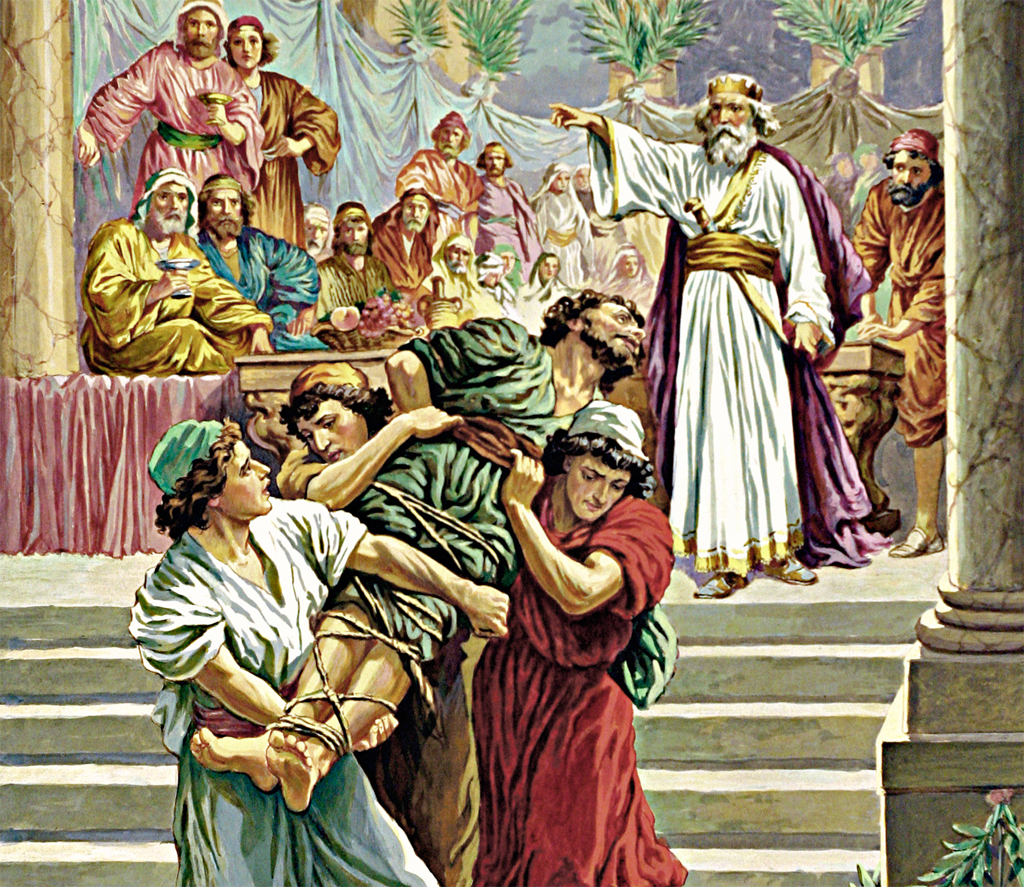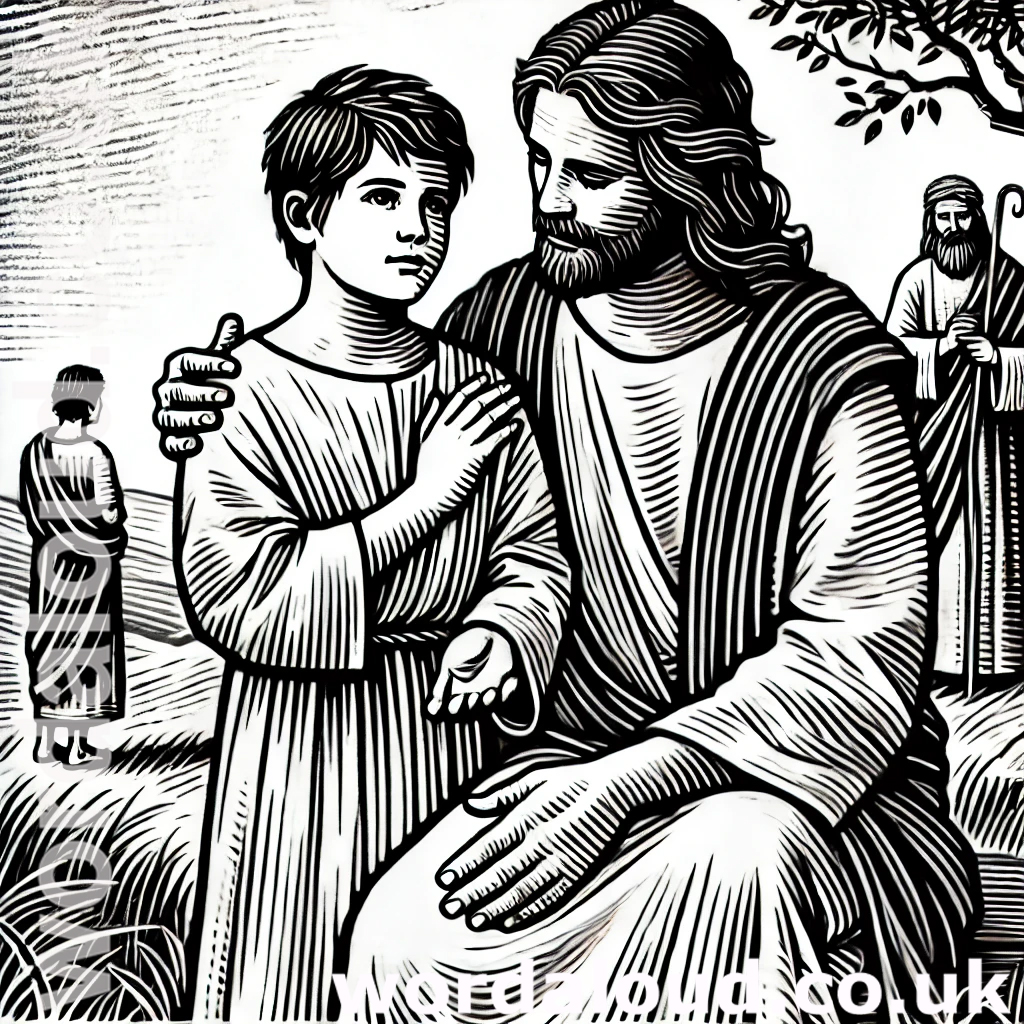Christian Art | Jesus Send His Disciples On Mission
Mark 6: 7-13 – Week 4 Ordinary Time, Thursday (King James Audio Bible KJV, Spoken Word)
7 ¶ And he called unto him the twelve, and began to send them forth by two and two; and gave them power over unclean spirits;
8 And commanded them that they should take nothing for their journey, save a staff only; no scrip, no bread, no money in their purse:
9 But be shod with sandals; and not put on two coats.
10 And he said unto them, In what place soever ye enter into an house, there abide till ye depart from that place.
11 And whosoever shall not receive you, nor hear you, when ye depart thence, shake off the dust under your feet for a testimony against them. Verily I say unto you, It shall be more tolerable for Sodom and Gomorrha in the day of judgment, than for that city.
12 And they went out, and preached that men should repent.
13 And they cast out many devils, and anointed with oil many that were sick, and healed them.
Trust in God. In a time and in a land where different communities lived side by side yet non-communicatively, fearing, suspecting and disliking one another, and often bound by religious laws telling them not to interact, it is all the more extraordinary that Jesus tells his disciples to trust in life, in providence, God, scriptures. in strangers’ hospitality, as they travel throughout the lands, as it would now be internationally, healing people and preaching the Gospel.
Trust in God. Jesus tells his disciples not to take their own food. This has implications concerning ritual purity. Jesus is, in effect, telling his disciples, who are all Jews, that they should eat with those they meet who offer to share their food with them. They are not to live separated. People are not anymore to live divided by such sectarian considerations. Scriptures on trusting God reach deeply through history of scripture in Jewish then Christian faith. As Christians, we are not to exclude or shield ourselves from others; we are to give ourselves to and share the love with the whole world.
Jesus gives his disciples the particular mission to cast out unclean spirits and to heal the sick. What we find, then, is that the disciples are entering into communities, sharing the life of those communities, and while living with the people there, they bring those communities together, by including again those people who were sick or possessed, who would have been outcast or marginalized, once more allowing those people a role in community life.
This is a mission of repentance and healing. It is sent, commissioned, in a spirit of love and friendship. The disciples do not travel alone; they go two by two. They are friends who will support one another’s spirits, sharing the difficulties as well as the joy of their experiences.
It must have been a very bold undertaking. Perhaps we would call the men brave, though we know they are filled with the joy of Christ beyond bravery. It can be beautiful to imagine how we might receive these missionaries of Jesus. Repent, say sorry for your sins, your sins are forgiven you. What joy is here.
Trust in God verse 8: ‘Take nothing for your journey.’
It is beautiful also to think of ourselves as such missionaries, carrying into our world this message: only say sorry for your sins and all is forgiven you; only believe in Jesus. This is a message we are asked to radiate.
‘The preacher should so trust in God that he is convinced that he will have everything he needs to support life, even if he cannot obtain it; for he should not neglect eternal things through worrying about temporal things.’ St Bede
Concluding Prayer
Grant us, Lord, a true knowledge of salvation,
so that, freed from fear and from the power of our foes,
we may serve you faithfully,
all the days of our life.
We make our prayer through our Lord.
![]()
Audio Bible KJV | Endnotes
Take Nothing On Your Journey
Mark 6:7-13 recounts the sending out of the twelve disciples by Jesus Christ on a missionary journey. This passage is full of valuable lessons and insights that are relevant to Christians today. One key message of this passage is that we must trust in God and rely on His provision as we carry out His work.
The passage begins with Jesus calling his disciples and sending them out two by two to preach and heal in various towns and villages. Jesus instructs the disciples to take nothing with them for their journey except a staff, no bread, no bag, no money in their purse, and to wear sandals but not to put on two coats.
This command by Jesus to the disciples to take nothing with them on their journey is a powerful reminder that as Christians, we are not called to rely on our own strength or resources, but to trust in God and rely on His provision. This is a recurring theme throughout the Bible, where we are called to trust in God’s provision and care for us.
The psalmist writes in Psalm 55:22: ‘Cast thy burden upon the Lord, and he shall sustain thee: he shall never suffer the righteous to be moved.’ The prophet Isaiah echoes this sentiment in Isaiah 41:10, ‘Fear thou not; for I am with thee: be not dismayed; for I am thy God: I will strengthen thee; yea, I will help thee; yea, I will uphold thee with the right hand of my righteousness.’
The apostle Paul also speaks of the importance of trusting in God’s provision in Philippians 4:19: ‘But my God shall supply all your need according to his riches in glory by Christ Jesus.’ These passages illustrate that we are called to trust in God’s provision, and He will always provide for us according to His will.
The command to take nothing on the journey also serves as a reminder that our ultimate goal as Christians is not material gain or comfort but to serve God and spread His message of salvation. This is echoed in Matthew 6:19-21, where Jesus tells his disciples: ‘Lay not up for yourselves treasures upon earth, where moth and rust doth corrupt, and where thieves break through and steal: But lay up for yourselves treasures in heaven, where neither moth nor rust doth corrupt, and where thieves do not break through nor steal: For where your treasure is, there will your heart be also.’
Many authorities who have emphasized the importance of trusting in God’s provision and relying on His strength. The Christian theologian Saint Augustine wrote: ‘Trust the past to God’s mercy, the present to God’s love, and the future to God’s providence.’
Protestant reformer Martin Luther also emphasized the importance of trusting in God’s provision, saying: ‘I have held many things in my hands, and I have lost them all; but whatever I have placed in God’s hands, that I still possess.’
The popular Christian author Max Lucado emphasizes the importance of trusting in God’s provision, writing in his book You’ll Get Through This: ‘The same God who led you in will lead you out. The same God who sustained you yesterday will sustain you today. The same God who provided for you then will provide for you now. You can trust Him.’
There are many stories of Christians who have trusted in God’s provision and seen His miraculous provision in their lives. One such story is that of George Muller, a Christian evangelist and orphanage director in the 19th century. Muller relied solely on prayer and faith to provide for the thousands of orphans under his care, and God miraculously provided for all their needs.
In his autobiography, Muller wrote: ‘I have joyfully dedicated my whole life to the object of exemplifying how much may be accomplished by prayer and faith…I have never made any collection…I have never asked anyone for anything. I have never, by God’s grace, written a single letter, or spoken to anyone personally, about our temporal needs.’
The Gospel teaches us that as Christians, we must trust in God’s provision and rely on His strength as we carry out His work. This means that we must be willing to let go of our own resources and rely on Him for everything we need. Through the Bible, we are reminded of the importance of trusting in God’s care and provision for us. May He guide and strengthen us.








